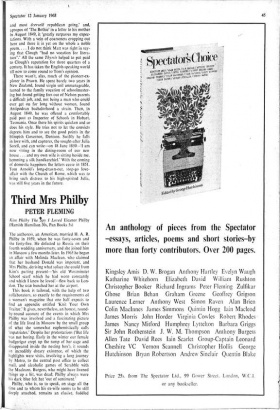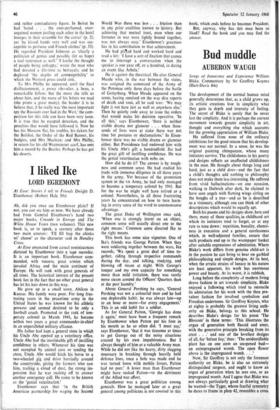Kim Philby Thepy I Loved Eleanor Philby (Hamish Hamilton 30s,
Pan Books 5s)
Third Mrs Philby
PETER FLEMING
Kim Philby Thepy I Loved Eleanor Philby (Hamish Hamilton 30s, Pan Books 5s)
The authoress, an American, married H. A. R. Philby in 1959, when he was forty-seven and she forty-five. He defected to Russia on their fourth wedding anniversary, and she joined him in Moscow a few months later. In 1965 he began an affair with Melinda Maclean, who claimed that her husband Donald was impotent, and Mrs Philby, deriving what solace she could from Kim's parting present—'his old Westminster School scarf which he had worn constantly and which I knew he loved';—flew back to Lon- don. The KGB bunched her at the airport.
This book is tailored, with the help of two collaborators, so exactly to the requirements of a woman's magazine that one half expects to find an appendix entitled 'Knit Your Own Traitor.' It gives, nevertheless, an honest, round- by-round account of the events in which Mrs Philby was involved and a fascinating picture of the life lived in Moscow by the small group of what she somewhat euphemistically calls 'expatriates.' Despite her protestations (Tut life was not boring. Early in the winter our female budgerigar crept up the ramp of her cage and disappeared inside the nesting box'), it sounds an incredibly dreary existence, of which the highlights were visits, involving a long journey by Metro, to the central post office to collect mail, and alcoholic games of Scrabble with the Macleans. Burgess, who might have livened things up a bit, was dead; Philby always wore his dark blue felt hat 'out of sentiment.'
Philby, who is, so to speak, on stage all the time and to whom his ex-wife seems to be still deeply attached, remains an elusive, fuddled and rather contradictory figure. In Beirut he had 'hated . . . the over-perfumed, over- sequined women jostling each other in the hotel lounges in their scramble for the caviar' (p. 2); yet 'he kissed hands very well and was sus- ceptible to perfume and French clothes' (p. 53). He regarded President Johnson as 'clearly a politician of genius and possibly (let us hope) a real statesman as well.' I loathe the thought of people being unhappy,' wrote the man who had devoted a life-time to betrayals; and he deplored 'the depths of contemptibility' to which the Western press could sink.
To Mrs Philby he appeared, until the final disillusionment, a preux chevalier, a hero, a remarkable fellow; but the more she tells us about him, and the more of his letters we read (she prints a great many), the harder it is to believe that, if he really was 'the most important spy the Russians ever had in the West,' the com- petition for this title can have been very keen. It is true that he escaped detection, and the penalties that would have followed it. Now he has his Moscow flat, his roubles, his tickets for the Bolshoi, the Order of the Red Banner, his budgies, and Mrs Maclean; and Mrs Philby, in return for his old Westminster scarf, has sent him a record by the Beatles. Perhaps he has got his deserts.































 Previous page
Previous page